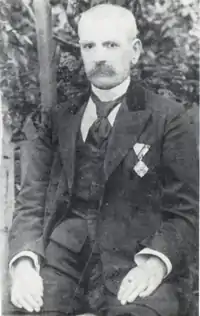Kuzman Shapkarev
Kuzman Anastasov Shapkarev, (Bulgarian: Кузман Анастасов Шапкарев), (1 January 1834 in Ohrid – 18 March 1909 in Sofia) was a Bulgarian[1][2] folklorist, ethnographer and scientist from the Ottoman region of Macedonia, author of textbooks and ethnographic studies and a significant figure of the Bulgarian National Revival.
Kuzman Shapkarev | |
|---|---|
 Kuzman Shapkarev decorated with the Bulgarian Order "For Civil Merit",
5th Class | |
| Native name | Кузман Шапкарев |
| Born | February 1, 1834 Ohrid, Manastir Vilayet Ottoman Empire |
| Died | March 18, 1909 (aged 75) Sofia, Bulgaria |
| Occupation | Writer, publicist, teacher, folklorist |
| Language | Bulgarian |
| Period | Bulgarian National Revival |
| Spouse | Elisaveta Miladinova-Shapkareva (d. 1870), Ekaterina Shapkareva |
| Children | Kliment Shapkarev, Ivan Shapkarev |
Biography
Kuzman Shapkarev was born in Ohrid in 1834. He was a teacher in a number of Bulgarian schools in Ohrid, Bitola, Prilep, Kukush, Thessaloniki, (1854-1883). In these towns he was especially active in introducing the Bulgarian language in local schools. Не initiated the establishment of two Bulgarian high schools in Solun in 1882–1883.
He wrote the following textbooks: "A Bulgarian Primer" (1866), "A Big Bulgarian Reader" (1868), "Mother tongue" (1874), "Short Land description (Geography)" (1868), "Short Religion Book" (1868) and others. Shapkarev criticized the dominance of eastern Bulgarian and even declared that it was incomprehensible in Macedonia. In his Great Bulgarian Textbook (Golema balgarska chitanka) from 1868, which he authored under the pseudonym "One Macedonian" (Edin Makedonets), he stated his intention to write in a language understandable to his compatriots, the Macedonian Bulgarians. He also announced a project of a dictionary that would contain translation from Macedonian into Upper Bulgarian and vice versa[3] This activity was condemned by the Bulgarian press, which even accused Kuzman Shapkarev of advocating the existence of a separate Macedonian language and of a distinct history of the Macedonian people.[4]
Shapkarev was a contributor of many Bulgarian newspapers and magazines – "Tsarigradski vestnik" (Constantinople newspaper), "Gayda" (Bagpipe), "Macedonia", "Pravo" (Justice), "Savetnik" (Adviser), "Balgarska pchela" (Bulgarian bee) and others. Shapkarev was a collaborator of the revolutionary Georgi Rakovski and in the field of ethnography, he assisted the Miladinov Brothers.
After 1883 he lived in Eastern Rumelia and Bulgaria – in Plovdiv, Sliven, Stara Zagora, Vraca and Orhanie (Botevgrad). Along with his scientific and public occupation in Bulgaria he worked as a notary and a judge.
From onwards 1900 he was a regular member of Bulgarian Academy of Sciences.
His autobiographical book is called "Materials for the Revival of Bulgarian national spirit in Macedonia".
The first son of Kuzman Shapkarev – Kliment was one of the leading activists of Internal Macedonian Revolutionary Organization,[5] while the second – Ivan was high-ranking Bulgarian Army officer.
Works
| Wikimedia Commons has media related to Kuzman Shapkarev. |
Scientific works
- Rusalii. The old and too interesting Bulgarian custom preserved in Southern Macedonia, Plovdiv, 1884
- "The Serbian Greatideas' endeavours and our scientifists", 1888
- "Several notes about Macedono-Slav collection of P. Draganov" 1895
- "Collection of folk monuments (Bulgarian folk tales and beliefs), 1885
- Collection of Bulgarian Folklore (Сборник от български народни умотворения), vol. І-ІІІ, Sofia, 1891–1894
- Materials for the Biography of the Miladinov Brothers - Dimitar and Konstantin (Материали за животоописанието на Братя Миладинови, Димитрия и Константина), Plovdiv 1884
Textbooks
- "A Bulgarian Primer", 1868
- "A Big Bulgarian Reader", 1868
- "Mother tongue", 1874
- "Short Land description (Geography)", 1868
- "Short Religion Book", 1868
- "The Bulgarian Folklore Collection" (Сборник от български народни умотворения), in several volumes:
- Books I,III,IV,V,VI - Песни (Songs)
- Book VII: Български обичаи, обряди, суеверия и костюмы (Bulgarian customs, rituals, beliefs and costumes), 1891
- Books VIII and IX: Български прикаски и вѣрования съ прибавление на нѣколко Македоновлашки и Албански (Bulgarian folktales and beliefs with some Macedo-Romanian and Albanian) 1892, 1894 (same, in a modern edition, with modernized spelling)
- (Note: Book II did not exist)[6]
Autobiographical books
- Contribution to education in Macedonia. One autobiography of Kuzman Shapkarev, Macedonian review, Sofia 1927, vol 2
- "Materials for Revival of Bulgarian national spirit in Macedonia", Sofia 1984
Honours
Shapkarev Buttress on Fallières Coast, Antarctica is named after Kuzman Shapkarev.
External links
- K.A. Shapkarev. Bulgarian Primer, part A. (Constantinople, 1868).
References
- Autobiography of Kuzman Shapkarev, 1864, Macedonian review, year ІІІ, 1927, № 1, № 2.; Also in "Materials for the Revival of Bulgarian national spirit in Macedonia"
- MacDermott, Mercia (1998). Bulgarian Folk Customs. Jessica Kingsley. p. 31. ISBN 1-85302-485-6.
- Tchavdar Marinov. In Defense of the Native Tongue: The Standardization of the Macedonian Language and the Bulgarian-Macedonian Linguistic Controversies. in Entangled Histories of the Balkans - Volume One. DOI: https://doi.org/10.1163/9789004250765_010 p. 442
- Den, June 9, 1875; Pravo, November 30, 1870
- Николов, Борис. ВМОРО – псевдоними и шифри 1893–1934, Звезди, 1999, стр. 6.
- Тодор Моллов, БЕЛЕЖКА НА РЕДАКТОРА - Editor's Note to a later edition
